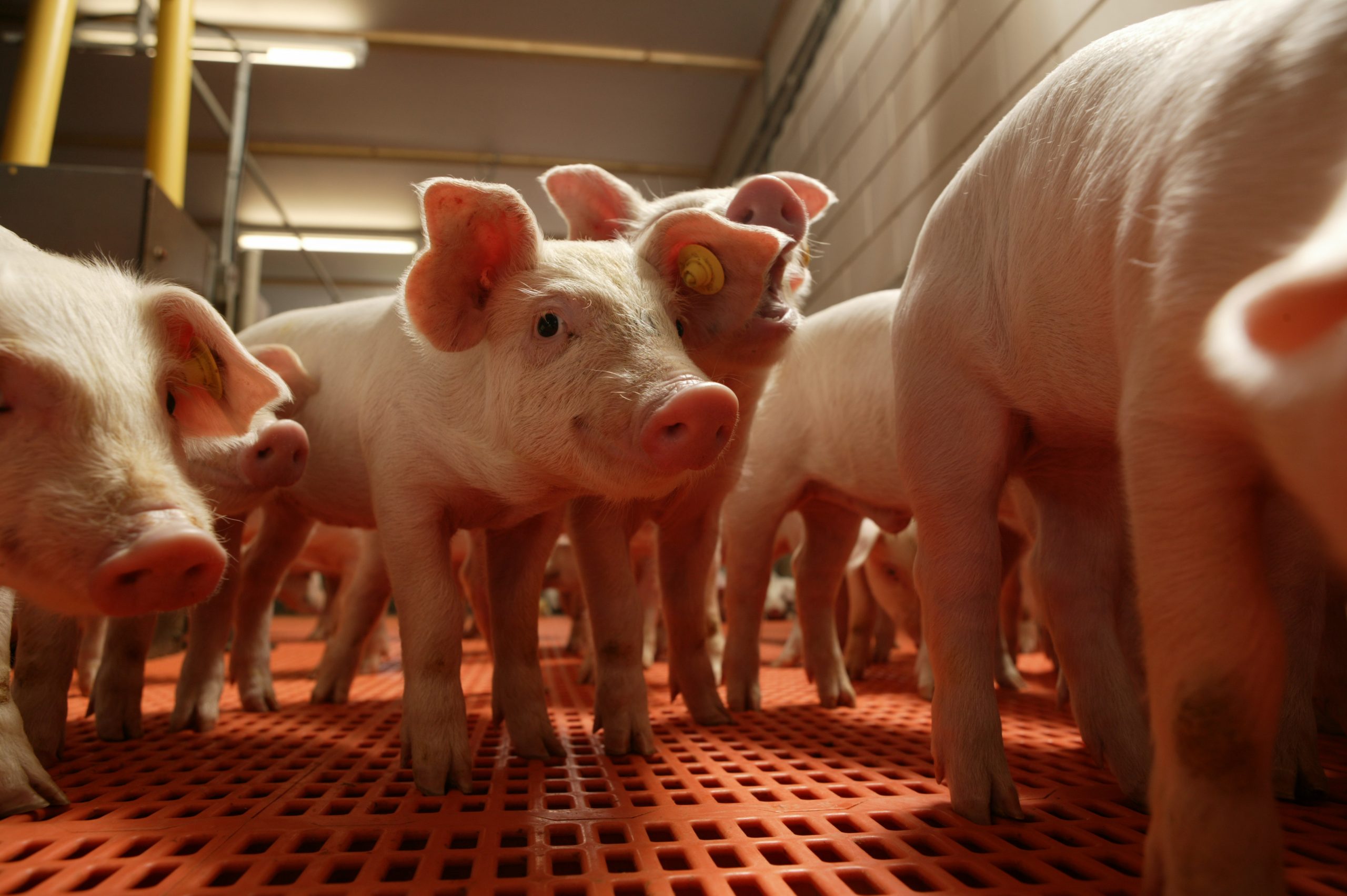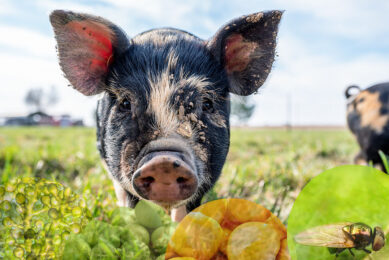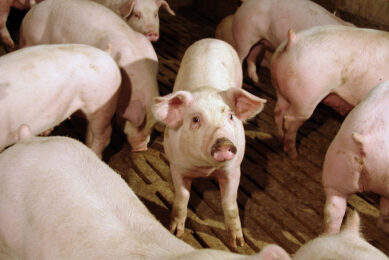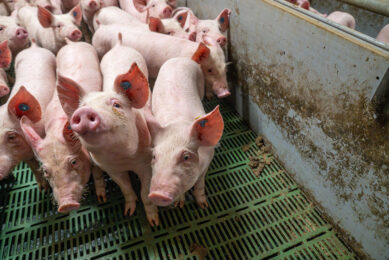Lactic acid bacteria promoted FCR piglets

Probiotic bacteria produce organic acids such as lactic acid. This has many beneficial properties for farm animals. A screening was done to find the best probiotics for piglets and their effect on growth parameters.
Weaning of piglets can be a stressful time for the animals, as weaning comes with change of diet from liquid to solid feed, which usually reduces the daily energy and nutrient intake thus piglets are more susceptible towards bacterial infection. In the past, antibiotics were sometimes used to prevent and treat infectious diseases induced by weaning stress. However, the use of preventive antibiotics is being banned in many regions around the world. Many feed additives are on the market that claim to be a suitable alternative for preventive antibiotics as they have a positive effect on gut health and immunity of the animals. One of these products include the probiotics, live microorganism that confers a health benefit to the host, when administered in adequate amounts. Probiotics not only help in the maintenance of the piglet’s health status but have also been shown to improve the growth and feed conversion ratio.
Host specific probiotics
Many microorganisms have been used as probiotics, but lactic acid bacteria (LAB) seem to have the most potential as a probiotic agent in swine nutrition. Earlier studies on isolation and selection of LAB from swine intestine and faeces to prepare probiotic preparation specific to swine, revealed that diet and species specificity of probiotics does exists. As the natural microflora stabilises in the gut more easily and quickly propagates to a very stable population; hence, an isolate from the host itself will be a more effective probiotic as compared to other sources. For an effective probiotic agent, LAB should be able to survive in gastric pH and bile salt, adhere and colonise in gut epithelial cells. Probiotic bacteria produce organic acids, hydrogen peroxide, bacteriocin and antimicrobial compounds which may exhibit either bactericidal or bacteriostatic properties. Host specific probiotics L. plantarumand L. acidophilus (swine intestine) and L. curvatus TUCO-5E (milk) have many benefits and and have antimicrobial activity against E. coli, Enterobacter spp. and Salmonella. Supplementation of species-specific probiotic bacteria conferred health benefits through maintenance of effective microbial balance between beneficial and harmful bacteria, enhancement of nutrient digestibility, growth and immune status in pigs. Feeding of LAB in weaning piglets also improved antioxidant defence mechanism (total antioxidant, superoxide dismutase, catalase, reduced glutathione and glutathione peroxidase status) thereby ameliorating oxidative stress.
Experiment in piglets
Keeping the above background in view, the present study was conducted with an objective of isolation, phenotypic and phylogenetic characterisation of LAB from piglet faeces and in-vitro evaluation of isolated LAB for probiotic properties. A total of 30 LAB were isolated from faeces of five healthy piglets (28 days old). All isolates were Gram positive, cocco-bacilli and catalase negative. Out of 30 LAB isolates, 20 were shortlisted on the basis of their tolerance to pH (3.0, 4.0, 7.0 and 8.0) and bile salts (0.075, 0.15, 0.3 and 1.0%). Whereas, 14 isolates were selected for further in vitro probiotic characterisation due higher (P<0.05) cell surface hydrophobicity to toluene (>45%). After this, a total of 36 (18 male:18 female) early weaned (28 day old) crossbred (Local x Landrace) piglets were used for the in-vivoexperiment. The piglets were distributed into three dietary groups (4 replicates of 3 each) in complete randomised design. Dietary treatments included; T0 (control-basal diet), T1 (basal diet + Lactobacillus acidophilus NCDC15; conventional dairy-specific probiotic) and T2 (basal diet + Pediococcus acidilactici FT28; swine-specific probiotic). The feeding experiment was conducted for a 90 day period. The growth performance was monitored throughout the experimental period of 90 days. Daily feed offered and refused was weighed and recorded to monitor daily dry matter intake (DMI). Piglets were weighed individually at weekly intervals to calculate growth parameters viz. average daily gain (ADG) and feed conversion ratio (FCR). At end of the feeding experiment, a digestion trial was conducted for seven days (3 days adaptation + 4 days collection) to know digestibility of the nutrients.
FCR improved in probiotic group
The final body weight, average daily gain (g/d), DM intake (g/d) did not differ (P>0.05) among the treatment groups (Table 1). Whereas, the feed conversion ratio was improved (P<0.05) in both probiotics supplemented (t1 and t2) groups compared to control (t0). the total tract apparent digestibility of crude protein was significantly higher (p><0.05) in t2 animals which were fed p. acidilactici ft28 as compared to t0 and t1. the crude fibre digestibility was higher (p><0.05) higher in t2 group in comparison to t0, whereas, t1 was comparable to t2 and t0 both, whereas, there was no effect on dry matter, organic matter and ether extract digestibility. in conclusion, the results of this study concluded with a preliminary depiction to establish a species-specific probiotic by applying valid criteria for the selection of isolates. a total of 30 lab were isolated from the faeces of piglets. the isolate lacp28 identified as>Pediococcus acidilactici FT28 showed consistent superiority over other isolates. The isolate Lacp28 showed wide spectrum inhibitory activities against number of pathogens including E. coli and Salmonella. It also had the capabilities for improvement of feed conversion ratio and blood hematological profile with better species-specificity in protein metabolism and antioxidant profile. But more feeding trials need to be conducted with P. acidilactici FT28 in pigs to assess dose per kg of weight and frequency of feeding with highest advantages.
Author:
Runjun Dowarah, et al*, ICAR-Indian Veterinary Research Institute, India
*Co-authors of this study are: Ashok Kumar Verma, Neeta Agarwal, Putan Singh and Bhoj Raj Singh. This article is a summary of the original paper: Selection and characterisation of probiotic lactic acid bacteria and its impact on growth, nutrient digestibility, health and antioxidant status in weaned piglets, published in PLOSone 13 (3).
Join 26,000+ subscribers
Subscribe to our newsletter to stay updated about all the need-to-know content in the feed sector, three times a week. Beheer
Beheer









 WP Admin
WP Admin  Bewerk bericht
Bewerk bericht